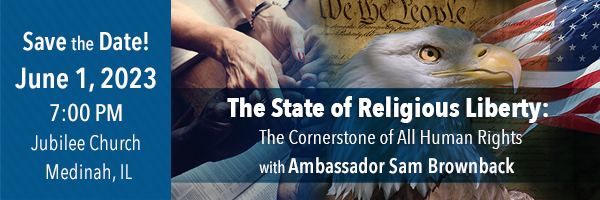America’s Declining Biblical Worldview
I’ve often heard the term “worldview” compared to a pair of glasses—your worldview is the lens that sits right in front of your spiritual eyes and affects the way you see everything. If your glasses are scratched, the whole world will look scratched. If your glasses are smudged, the whole world will look smudged. And if your glasses are pink-tinted, the whole world will look pink. And so, the best way to deal with someone who insists the world is pink is not to endlessly debate back and forth about any particular object whose color you disagree about, but rather to change out their glasses for a pair that lets them see the world as it really is.
But your worldview is similar to your glasses in another way—both require intentional effort to maintain. Give someone a new pair of lenses, and they can quickly become scratched and smudged if they aren’t consciously taken care of and maintained. And in our fallen world, we encounter scratches and smudges in our culture every day.
The same is true of our worldview. Our fundamental beliefs about God, creation, man, sin, redemption, and the trajectory of history all prompt us to bend the information we receive in one way or another. Using the wrong worldview, we’ll see the world in a distorted, discolored, or downright smudgy manner. Using the correct worldview, we’ll see the world clearly as God sees it. But—just like with your physical glasses—merely starting off with a correct worldview does not guarantee a lifetime of wisdom. Your worldview must be guarded against the scratches of half-truths and compromises that will cause it to deteriorate over time. Such seems to be the case in America today.
A recent poll conducted by the Wall Street Journal and the University of Chicago’s National Opinion Research Center (NORC) reveals saddening trends in the American worldview. Although the study was not explicitly a “worldview survey”—it covered a wide variety of topics ranging from the economy to childbearing—a few of the poll’s questions shed light on how Americans’ deep worldview principles have changed over recent years.
Of today’s Americans, only 39% say that religion is very important to them, as opposed to 62% in 1998. Even as recently as 2019, approximately 50% of Americans affirmed this. Further, only 30% of today’s Americans say that having children is very important to them, a sharp decline from 1998’s count of approximately 60%. And since 2019’s percentage was still in the low 40’s, much of this decline appears to have happened just over the last three years. These declining numbers point to a decline in major tenets of the Christian worldview—God is the center of life and the most important focal point of it, and man is called to be fruitful and multiply.
Other factors, which are not as directly tied to one’s spiritual worldview, but important nonetheless, have declined as well: patriotism is “very important” to just under 40% of Americans (as opposed to almost 70% of 1998 America), and community involvement is approaching a meager 20% (contrasting with almost 50% in 1998).
Why are such principles—historically assumed to be “American values”—now on the decline? WSJ offers a possible explanation:
A number of events have shaken and in some ways fractured the nation since the Journal first asked about unifying values, among them the Sept. 11, 2001, terrorist attacks, the financial crisis of 2008 and subsequent economic downturn and the rise of former President Donald Trump.
Well, that seems to be a decent partial explanation, especially for factors such as community involvement in the post-Covid world. However, it’s important not to take such materialistic explanations too far and think that as long as the country is clipping along in relative peace and prosperity, then Americans will begin to seek God again. One of the most repeated messages in the history of the Old Testament is that prosperity is actually a pitfall for godliness—when a nation is prosperous, she tends to forget God, because she assumes He is now unnecessary. And if a nation truly fears God, hardship will prompt her to call on Him in her distress. America’s declining Christian worldview is not merely a product of troublesome times. It is a symptom of spiritual decay.
So what is the spiritual solution? How do you restore something as fundamental as a nation’s worldview? Only the work of the almighty God can do that, but thankfully, God tends to leave the same sorts of fingerprints where He works. Dr. George Barna and Arizona Christian University’s Cultural Research Center have identified seven basic beliefs strongly correlated with a biblical worldview; 80% of adults who adhere to them are classified as having a biblical worldview. As ACU puts it, they are:
1) An orthodox, biblical understanding of God.
2) All human beings are sinful by nature; every choice we make has moral considerations and consequences.
3) Knowing Jesus Christ is the only means to salvation, through our confession of sin and reliance on His forgiveness.
4) The entire Bible is true, reliable, and relevant, making it the best moral guide for every person, in all situations.
5) Absolute moral truth exists—and those truths are defined by God, described in the Bible, and are unchanging across time and cultures.
6) The ultimate purpose of human life is to know, love, and serve God with all your heart, mind, strength, and soul.
7) Success on earth is best understood as consistent obedience to God—in thoughts, words, and actions.
On the one hand, none of these should be surprising. Didn’t I just list 7 biblical teachings? So am I not just basically saying “if you want a biblical worldview, you need to believe the Bible?” In a way, yes—the answer doesn’t get much more simple than that. God offers no substitute for repentance, and He offers no alternative framework for reality than His own inspired Word. If America is going to recover a Christian worldview, it will simply have to start believing the Word of God again, and it doesn’t get much simpler than that.
On the other hand, however, these seven tenets do provide us with a clarified look at the problem we face. The generalized and slightly nebulous question, “how well does my family/community/government believe the Bible?” can mean many different things to many different people. But these seven principles help us examine the specific ways in which our community is falling short, and thus specific directions for preaching the truth to those who need to hear it. Once we identify the individual scratches in a pair of glasses, it’s a lot easier to deal with them.
With these specific cornerstones of a biblical worldview identified, ACU found that only 3% of adults currently adhere to all seven. This means that 97% of adults have a sub-Biblical worldview. We have a lot of work to do.

